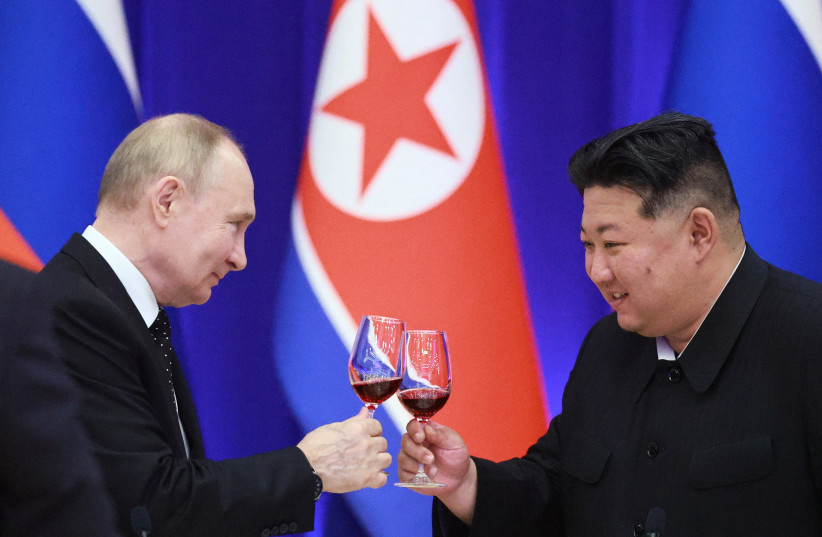Defying Western attempts to isolate Russia during its ongoing war with Ukraine, Russian President Vladimir Putin visited Vietnam earlier this month to strengthen ties following a strategic meeting with North Korean leader Kim Jong Un. During his two-day visit to the Vietnamese capital, Hanoi, where he met with Vietnamese President To Lam and other members of the Communist Party of Vietnam, Putin hinted at possible changes to Russia’s nuclear doctrine.
For more stories from The Media Line go to themedialine.org
Putin discussed potential amendments during a press conference in Hanoi, explaining that the changes might be necessary due to Western development of “low-yield nuclear explosive devices.” Although he did not provide specifics, Putin rejected the inclusion of a “preemptive strike” concept in the doctrine, stating that Russia’s retaliatory capabilities are sufficient to destroy any enemy.
Putin also mentioned the possibility of supplying weapons to North Korea, in line with a previous strategic partnership and mutual assistance agreement between the two nations. This agreement, signed by Putin and Kim, obligates both countries to offer immediate military support to each other in case of armed aggression.
John Kirby, spokesperson for the White House National Security Council, voiced concern over this pact, though he noted it was anticipated. Kirby added that Russia’s request for military assistance from North Korea reflects a “sign of desperation.”

Playing with nuclear threat - Putin's approach to the West
The Media Line spoke to military and international relations experts to gain insight into Putin’s statement regarding nuclear weapons. According to military analyst David Sharp, the vagueness of Putin’s statement indicates that, as before, this is a game of so-called nuclear blackmail.
“The goal is to intimidate Western countries and leaders to prevent them from expanding their assistance to Ukraine in various ways,” Sharp told The Media Line. “We see the exploitation of nuclear blackmail by both Putin and Medvedev, who even does it in an almost anecdotal manner, and by all propagandists. The point of nuclear blackmail is to deter assistance to Ukraine to some extent. This strategy has been working for the past two years,” Sharp added.
Dr. Nikolai Topornin, an expert in international relations and geopolitics, confirmed that the frequent mention of the nuclear doctrine is primarily directed at NATO countries and those with significant military capabilities actively supporting Ukraine. “The Kremlin may have certain concerns due to statements from some EU leaders. For example, [French] President Macron mentioned that under certain circumstances, France might send its armed forces to Ukraine,” Topornin explained to The Media Line.
Topornin agreed that Putin’s reference to the nuclear doctrine aims to prevent active Western military intervention in the war with Ukraine. “That’s why he reminded them that Russia has nuclear weapons. It’s a hint that if the situation changes drastically and Russia is forced into a defensive position, nuclear tactics could be employed,” he noted. “For example, look at what happened in Sevastopol. This is an example of situations where Russia needs to defend itself,” Topornin added.
On June 23, Sevastopol, annexed by Russia, was attacked by missiles, and debris from the munitions fell on Uchkuyevka beach, killing four people. Local residents reported that no siren had been activated during the attack and there had been no shelters nearby.
“The nuclear doctrine is purely defensive,” noted Topornin. “We already know that the West supports Kyiv, providing money, weapons, tanks, BMPs, and artillery systems,” he added. Topornin noted that Ukraine’s military potential is significantly lower than Russia’s, and Russia has the upper hand in all parameters. “But if we talk about a potential second front where Ukraine unites with Western countries, the situation could change drastically,” he said. “Everyone understands what nuclear war could bring, especially since the West is undoubtedly stronger than Russia in the nuclear sphere. If we approach this rationally and assume that Putin retains some level of sanity, the chances of a nuclear attack are extremely low,” Sharp added.
“Although, when a country has an authoritarian or dictatorial regime where one person makes the decisions, the risks of unexpected moves that don’t fit the logic of the Western or democratic world increase,” he said. According to Topornin, Russia has both strategic and tactical nuclear weapons. “There are intercontinental ballistic missiles, now the new generation is being equipped with multiple warheads capable of hitting targets up to 15,000 kilometers away, meaning they can strike US territory,” he explained. “These are very powerful missiles that cause colossal damage because the multiple warheads cover several hundred kilometers at once, and Russia has a lot of these missiles and nuclear warheads,” he added.
Sharp noted that since Russia’s tactical nuclear weapons consist of small warheads, which are usually not deployed on long-range carriers, they are not intercontinental. “There are, of course, so-called nuclear units. These include ground-based, mobile, and silo-based intercontinental missiles. There are also submarines and strategic aviation capable of launching cruise missiles with nuclear warheads,” he added.
Despite frequent cooperation with Iran, Topornin believes that Russia does not support Iran in creating nuclear weapons. “I don’t see any interest for Russia in spreading nuclear weapons worldwide. At the moment, there is no assistance from Russia in creating nuclear warheads. If Iran were to acquire such tactical nuclear charges, it could end disastrously,” he said.
Sharp explained that Russia’s nuclear cooperation with Iran exists in the civilian sphere. “Russia built a nuclear power plant for Iran. It’s clear that where there is a nuclear power plant, scientists develop nuclear technologies. This contributes to the creation of nuclear weapons, but these are still different sectors. Building a nuclear power plant cannot be considered assistance in creating nuclear weapons,” he concluded.
